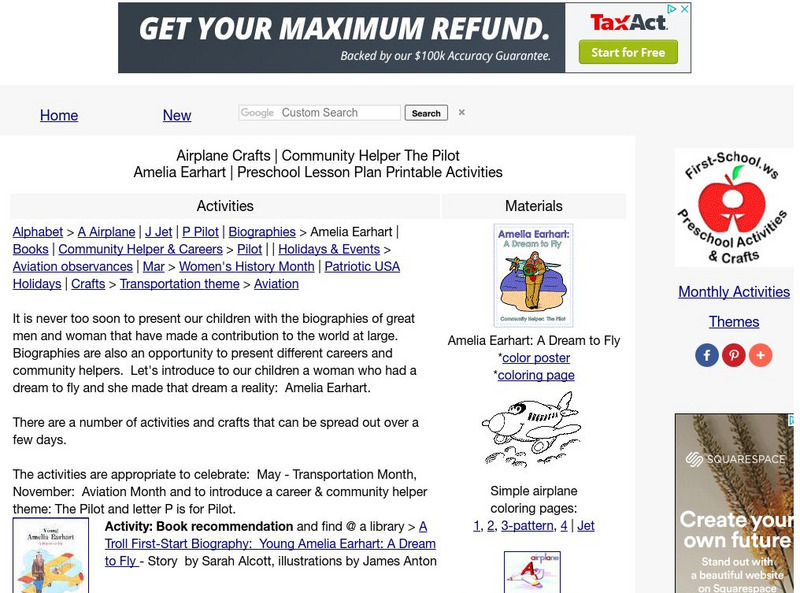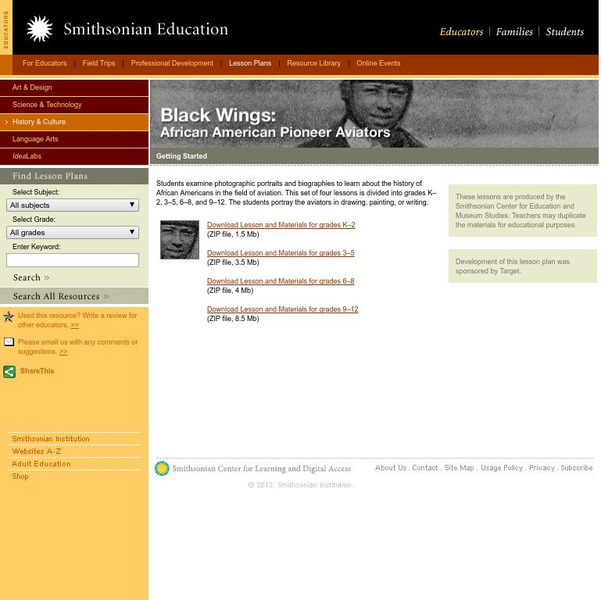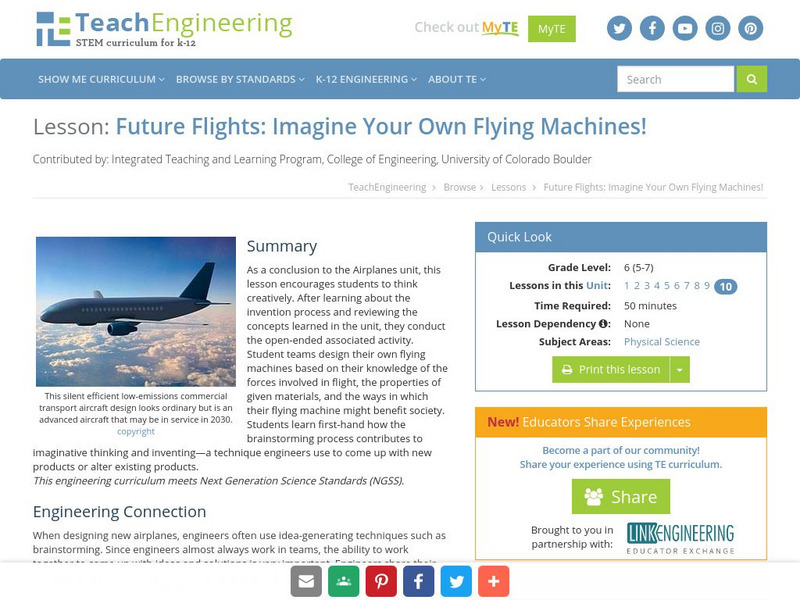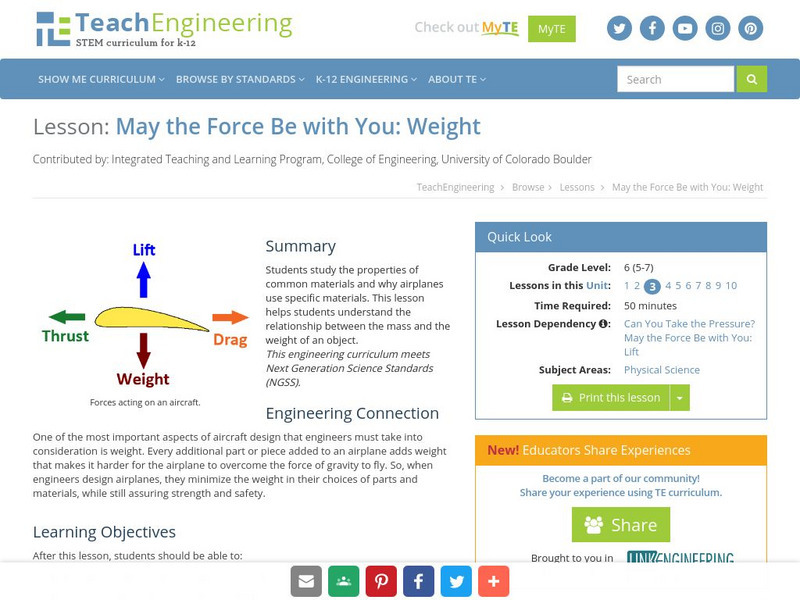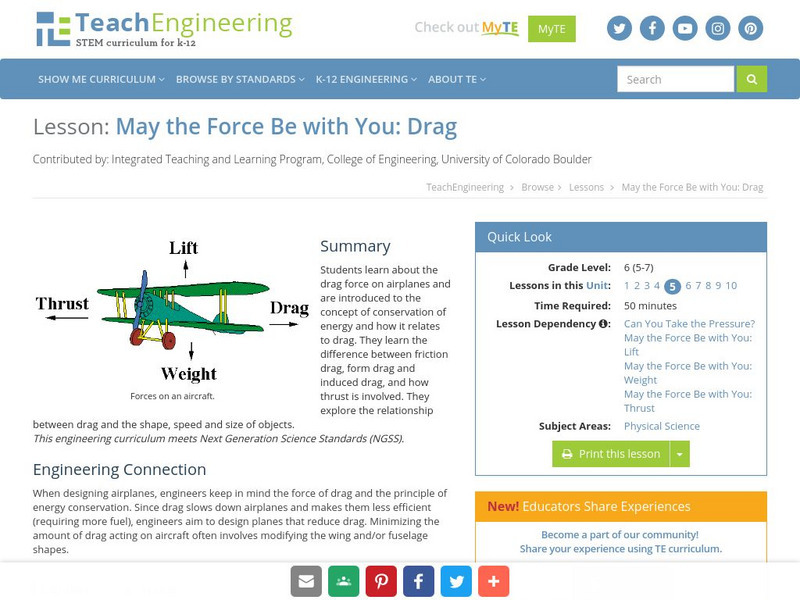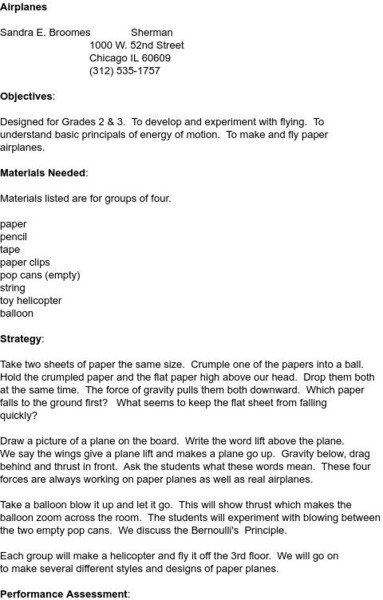Hi, what do you want to do?
Other
Lesson Plan Activities: Amelia Earhart and Airplanes
This site features several lesson ideas and activities on Amelia Earhart and airplanes for young learners.
TeachEngineering
Teach Engineering: Land! Water! Sky! Oh My!
This lesson plan focuses on the importance of airplanes in today's society. Airplanes of all shapes and sizes are used for hundreds of different reasons, including recreation, commercial business, public transportation, and delivery of...
Science Buddies
Science Buddies: Defining an Engineering Design Problem With Paper Airplanes
In this fun lesson, you will be the "customer" ordering a paper airplane, and your student teams will be engineering companies that will manufacture planes. Before they start making planes, they need to define the criteria and...
Smithsonian Institution
Smithsonian Education: Lesson Plan: Black Wings: American Pioneer Aviators
With this resource, teachers can select the most appropriate academic level and download a lesson plan that contains images, Word documents and PDF resources for teaching about the history of black Americans in aviation. Excellent...
PBS
Pbs Teachers: Supersonic Dream
Examine how fuel use affects the mass of different planes during flight. This lesson plan teaches students how to determine the per person fuel cost of a transatlantic flight for seven airplanes, and display the results on a bar graph....
Smithsonian Institution
Smithsonian Learning Lab: How Things Fly: Activities for Teaching Flight
Through this series of three lessons, students will gain an understanding of the basics of flight. They will learn about the four forces of flight and practice their observation skills through a number of fun experiments. In addition,...
TeachEngineering
Teach Engineering: Future Flights!
This lesson is an exciting conclusion to the airplanes unit that encourages students to think creatively. After a review of the concepts learned, students will design their own flying machine based on their knowledge of the forces...
TeachEngineering
Teach Engineering: May the Force Be With You: Lift
Students revisit Bernoulli's Principle (Lesson 1 of the Airplanes unit) and learn how engineers use this principle to design airplane wings. Airplane wings create lift by changing the pressure of the air around it. This is the first of...
TeachEngineering
Teach Engineering: May the Force Be With You: Weight
The purpose of this lesson is to help students understand the relationship between the mass and the weight of an object. Students will study the properties of common materials and why airplanes use specific materials.
TeachEngineering
Teach Engineering: May the Force Be With You: Drag
This instructional activity explores the drag force on airplanes. The students will be introduced to the concept of conservation of energy and how it relates to drag. Students will explore the relationship between drag and the shape,...
Science and Mathematics Initiative for Learning Enhancement (SMILE)
Smile: Lab Activity: Aviation
This site from the Illinois Institute of Technology provides a student lab activity in which the flight of a paper airplane is investigated and studied. Designed for primary grades, but easily adaptable for junior high students.
TeachEngineering
Teach Engineering: What Makes Airplanes Fly?
Students begin to explore the idea of a force. To further their understanding of drag, gravity and weight, they conduct activities that model the behavior of parachutes and helicopters. An associated literacy activity engages the class...
TeachEngineering
Teach Engineering: What Is Newton's Third Law?
Young scholars are introduced to Newton's third law of motion, and then learn that engineers apply Newton's third law and an understanding of reaction forces when designing a wide range of creations, from rockets and aircraft to door...
Other
Ontario Council for Technology Education: Transportation Design and Construction [Pdf]
For this project, learners will develop knowledge and skills related to the construction of vehicle/craft systems. They will identify and describe the major systems and components of vehicles, aircraft, and/or watercraft such as body,...
Science and Mathematics Initiative for Learning Enhancement (SMILE)
Smile: Airplanes (2 3)
This paper airplane lesson plan helps students learn about certain concepts like air resistance, motion, and aerodynamics.
Smithsonian Institution
National Air and Space Museum: Wright Brothers: Embracing the Impossible [Pdf]
In this lesson, students explore primary resources to see what people who lived in the early age of flight felt about this innovation. They then compare that response to that towards an invention of today.
Center for Innovation in Engineering and Science Education, Stevens Institute of Technology
Ciese Navigational Vectors
For this project, students use real time data to learn how pilots navigate when they fly. Students go through a series of lessons on vectors, weather maps and flight tracking, then take a pilot's test where they apply what they have...
C-SPAN
C Span Classroom: Lesson Plan: Examples of Regulatory Agencies
In this instructional activity, students learn about the costs and benefits of regulations and regulatory agencies. It includes nine video clips.
TryEngineering
Try Engineering: Engineered Sports
Learners work in teams to investigate how aerospace engineering relates to sports, especially golf ball design and the physics of bounce. They use this information to determine whether these aerospace principles can be applied to...
Council for Economic Education
Econ Ed Link: Transportation: They Say We Had a Revolution (Part 1)
Advancements in transportation have played a key role in the growth of our nation. U.S.government policies have also had a considerable impact on the development of transport as we know it today. In this series of three lessons, the...
Discovery Education
Discovery Education: Inventors and Inventions 2: Air and Space
After discussing important flying inventions, young scholars explore technological design by making paper airplanes.
Council for Economic Education
Econ Ed Link: Transportation: They Say We Had a Revolution (Part 3)
Advancements in transportation have played a key role in the growth of our nation. U.S. government policies have also had a considerable impact on the development of transport as we know it today. In this series of three lessons, the...
Alabama Learning Exchange
Alex: Let's Calculate Flight!
Students will use stop watches to help understand elapsed time when they fly paper airplanes through the air. Students will then move on to using clocks. Students will work out elapsed time word problems using made up flight schedules.
Alabama Learning Exchange
Alex: Building a Paper Airplane Using Bernoulli's Principle
This is a culmination activity used after students have studied Bernoulli's Principle as part of a unit on forces and fluids. Students will use the Internet, textbooks, library resources and their cooperative learning group to design...
Other popular searches
- Aviation and Aerospace
- Aviation History
- Aviation Topics
- Aviation Powerpoint
- Applied Math for Aviation
- Careers in Aviation
- Aviation Lesson Plans
- History of Aviation
- Flight, Aviation
- Aviation Classroom Projects
- Aviation Industry
- Aviation Pioneers





